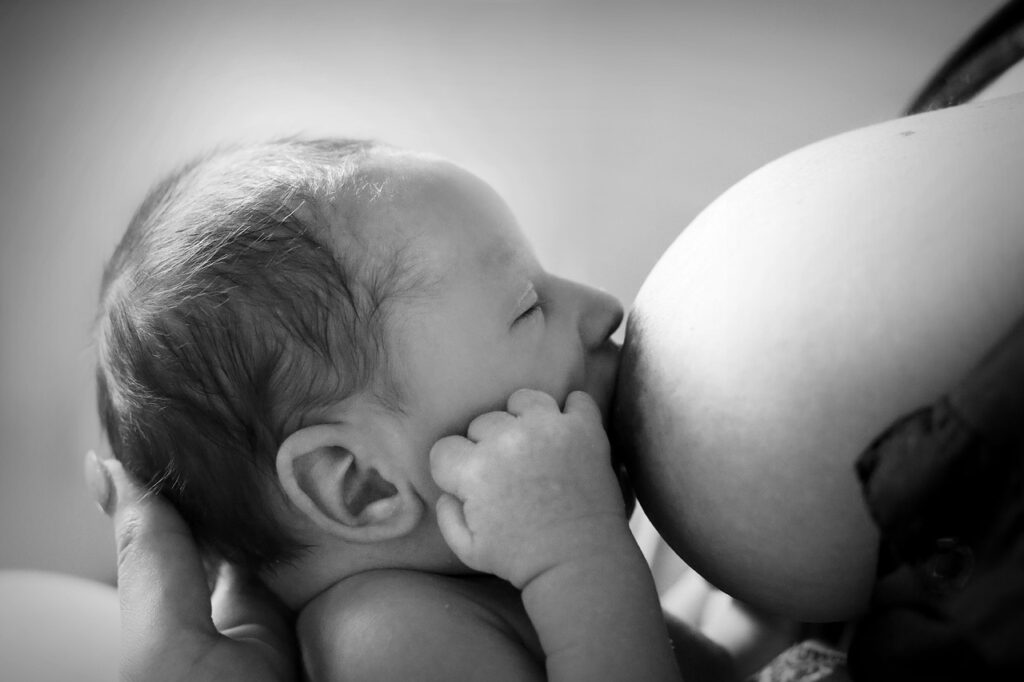
Having a baby in 2020 brought unique challenges that no one anticipated. Many new mothers, pediatricians, and breastfeeding professionals are learning about breastfeeding with Covid-19.
Do mothers and babies need to separate if a mother is positive for covid-19? What about if she’s simply exposed? Is breastfeeding safe with Covid-19?
These are the questions professionals and new parents have during this unprecedented time. We know that breastfeeding is an important part of helping a baby develop their immune system. We also know it is helpful in keeping an infant hydrated and nourished while they’re feeling unwell.
However, we also know that Covid-19 is a highly contagious and potentially dangerous. So, what does that mean for breastfeeding and Covid-19?
The World Health Organization Recommends Breastfeeding With Covid-19
The World Health Organization (WHO) follows health and wellness on the global level. With information from top epidemiologists, scientists and other healthcare professionals they compile the latest data and evidence to provide guidelines.
Covid-19 has been no different than other global health concerns in terms of the WHO’s involvement. They’ve been closely tracking data and helping us to figure out the safest recommendations.
Outside of Covid-19 and major health crises, the WHO keeps up-to-date information about pregnancy, birth, breastfeeding, the postpartum period and more. Between their previous recommendations about breastfeeding and their current information about Covid-19, they’ve made recommendations.
Their current recommendation says:
“WHO recommends that mothers with suspected or confirmed COVID-19 should be encouraged to initiate or continue to breastfeed. Mothers should be counselled that the benefits of breastfeeding substantially outweigh the potential risks for transmission.
Mother and infant should be enabled to remain together while rooming-in throughout the day and night and to practice skin-to-skin contact, including kangaroo mother care, especially immediately after birth and during establishment of breastfeeding, whether they or their infants have suspected or confirmed COVID-19.”
Why Would The WHO Recommend Breastfeeding While Sick?
Breastfeeding is an important part of infant and young child survival. It provides nutrition, development, and it’s important for maternal health.
The WHO recommends exclusively breastfeeding for the first 6 months of life, then continued breastfeeding with complementary foods for 2 years or beyond. The American Academy of Pediatrics recommends exclusive breastfeeding until 6 months, with complementary foods until one year, then as long after as both parties desire.
Early skin-to-skin, rooming in, and kangaroo care are important for both mother and baby. For baby, it helps regulate body temperature, breathing, encourages early bonding, and is beneficial for establishing breastfeeding. For mother, early skin-to-skin helps with milk supply, reduces the risk of postpartum hemorrhage, and provides oxytocin to help cope with stress hormones.
Breastfeeding, skin-to-skin, and rooming in during at least the first 6 months of life improve both infant and maternal health on a global scale. In short, breastfeeding saves lives. It’s an important part of infant development and building their immune system.
Due to the importance and benefits of breastfeeding, the WHO recommends continued breastfeeding even if a mother has COVID-19.
Is Breastfeeding With Covid-19 Truly Safe?
Covid-19 is a serious illness which greatly impacts the respiratory and other body systems. While some manage to quickly fight it off, others suffer long lasting effects. For these reasons, it’s understandable that parents and even some professionals worry about breastfeeding and Covid-19.
However, the WHO bases their recommendations on up-to-date data and evidence. Using a living review, they came up with the current breastfeeding recommendations. The search was conducted on Cochrane Library, EMBASE (OVID), PubMed (MEDLINE), Web of Science Core Collection (Clarivate Analytics) and the WHO Global Database. A total of 12,198 records were retrieved, 6945 were screened after removing duplicates, and 153 records with mother-infant dyads in which the mother had COVID-19 were included in full-text review.
Their results found:
“46 mother-infant dyads had breastmilk samples tested for COVID-19. All mothers had COVID-19, while 13 infants tested COVID-19 positive. Breastmilk samples from 43 mothers were negative for the COVID-19 virus while samples from 3 mothers tested positive for viral particles by RT-PCR. Among the 3 infants whose mothers’ breastmilk tested positive for virual RNA particles, not live virus, one infant tested positive for COVID-19 but infant feeding practices were not reported. The two other infants tested negative for COVID-19; one was breastfed, and the other newborn was fed expressed breast milk after viral RNA particles were no longer detected. In the single child with COVID-19, it was unclear through which route or source the infant became infected, i.e. through breastmilk or droplet from a close contact with the infected mother.”
While there are limitations, based on these samples and outcomes, they cannot recommend cessation of breastfeeding due to Covid-19. The benefits of breastfeeding, including the immune support if the child contracts Covid-19, outweigh the risk of possible transmission via breastmilk.
What Does This Mean For Parents And Professionals?
Unless or until there are different recommendations, parents and professionals should support a healthy breastfeeding relationship. If a mother is sick or exposed to Covid-19 she may need additional support and practical help so she can heal while also breastfeeding.
Should a mother become extremely ill, her physician should advise on individual recommendations specific to her health.